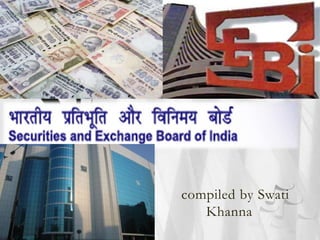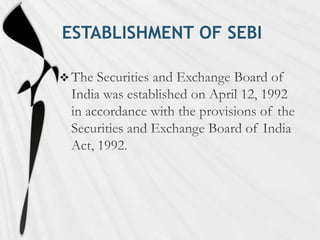Sebi
- 1. compiled by Swati Khanna
- 3.  
- 4. 
- 5.  
- 6.  
- 7.  
- 8.   
- 11. PREAMBLE  
- 12. SEBI 
- 13. Mission of SEBI  NOTE:
- 14. Important role Of SEBI  Power of the board to order investigation  Power of investigating authority  Prohibition to dealing in certain securities  Prohibition of unfair trade practice, fraudulence  Duty to Co-operate
- 15. Function of SEBI  SEBI is expected to regulate the business in stock exchanges and any other securities market. ________________________________________________________________  Registering and regulating the working of collective investment schemes, including mutual funds is a responsibility of SEBI. ________________________________________________________________  SEBI is responsible for prohibiting fraudulent and unfair trade practices relating to securities markets. ________________________________________________________________  Prohibiting insider trading in securities, with the imposition of monetary penalties, on erring market intermediaries. ________________________________________________________________  Regulating substantial acquisition of shares and takeover of companies. ________________________________________________________________
- 16. Registration & regulation of the working of intermediaries. Primary Market Secondary Market Merchant Bankers Stock- Brokers Underwriters Sub- Brokers Portfolio Managers
- 17.   
- 18.    
- 19.  
- 20.  





















